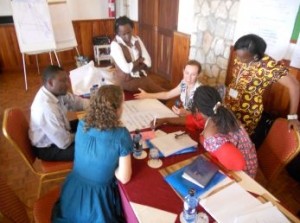Participatory approaches require the commitment and valuable time of many. Yet, the benefits are far-reaching. Participatory evaluation allows groups to:
Identify locally relevant evaluation questions
Participatory evaluation ensures that the evaluation focuses on locally relevant questions that meet the needs of program planners and beneficiaries. Participatory approaches allow local stakeholders to determine the most important evaluation questions that will affect and improve their work.
Improve program performance
Participatory evaluation is reflective and action-oriented. It provides stakeholders, including beneficiaries, with the opportunity to reflect on project progress and generate knowledge that results in being able to apply the lessons learned. It provides opportunities for groups to take corrective action and make mid-course improvements.
Empower participants
A participatory approach is empowering because it claims the right for local people to control and own the process of making evaluation decisions and implementing them. Participating in an evaluation from start to finish can give stakeholders a sense of ownership over the results. Recognizing local talents and expertise builds confidence and pride in the community, and among participants.
Build capacity
Conducting a participatory evaluation promotes participant learning and is an opportunity to introduce and strengthen evaluation skills. Active participation by stakeholders can result in new knowledge and a better understanding of their environment. This, in turn, enables groups to identify action steps and advocate for policy changes. It can provide participants with tools to transform their environments.
Develop leaders and build teams
Participatory evaluation builds teams and participant commitment through collaborative inquiry.  Inviting a broad range of stakeholders to participate and lead different parts of the process can develop and celebrate local leadership skills. It can lead to stronger, more organized groups by strengthening the community’s resources and networks.
Inviting a broad range of stakeholders to participate and lead different parts of the process can develop and celebrate local leadership skills. It can lead to stronger, more organized groups by strengthening the community’s resources and networks.
Sustain organizational learning and growth
Finally, a participatory evaluation is not just interested in findings; it is focused on creating a learning process. It creates a knowledge base among local people and organizations, which can be applied to other programs and projects. The techniques and skills acquired can lead to self-sustained action.
Four Guiding Principles of Participatory Evaluation
Participant focus and ownership
Structures and processes are created to include those most frequently powerless or voiceless in program design and implementation. The participatory process honors human contributions and cultural knowledge.
Negotiation
Participants commit to work together to decide on the evaluation focus, how it should be conducted, how findings will be used and what action will result. Often the process requires addressing differences in point of view and conflicts.
Learning
Participants learn together to take corrective actions and improve programs.
Flexibility
Uses creative methodologies to match the resources, needs and skills of participants.

